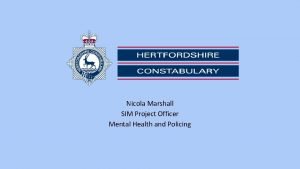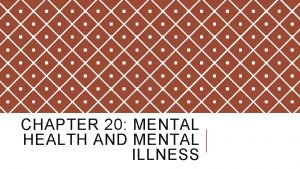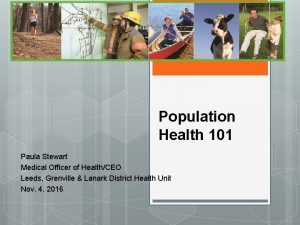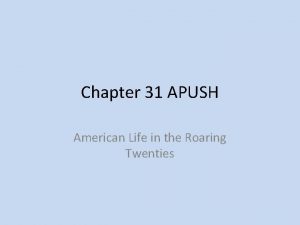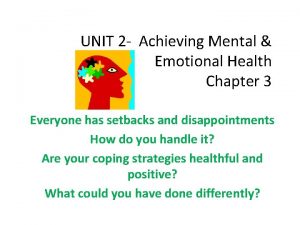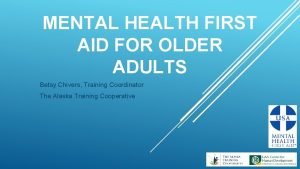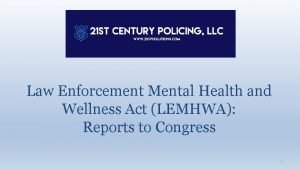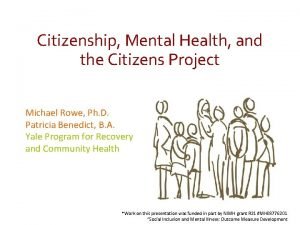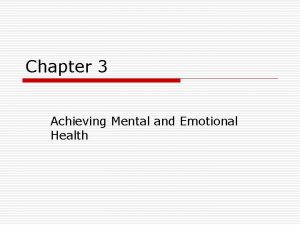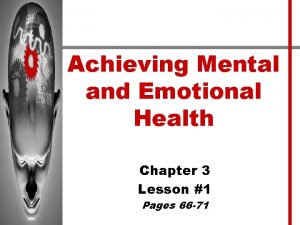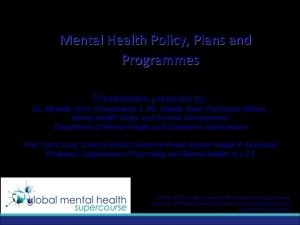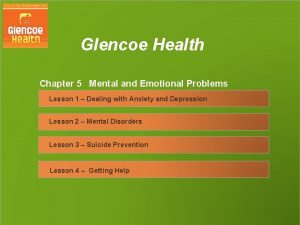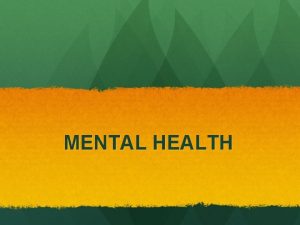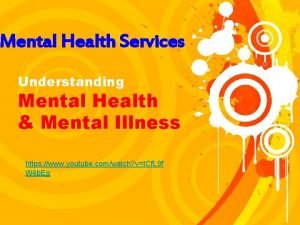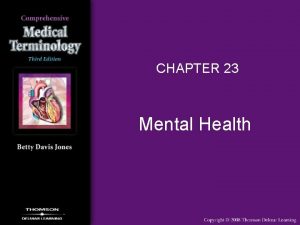Nicola Marshall SIM Project Officer Mental Health and















- Slides: 15

Nicola Marshall SIM Project Officer Mental Health and Policing

How Police and Mental Health work together • Strategic involvement e. g. Crisis Care Concordat and sub-groups • Specialist teams e. g. Triage / Custody / Safeguarding / SIM / ASB • Liaison re specific cases / issues where required e. g. community issues, frequent attenders • Non-crime referrals (safeguarding/other needs) • Training to all officers

Training for officers • Initial training includes 2 days on Mental Health Day One – law and procedure Day Two – guest speakers including street triage nurse - what they do/how they do it/ likely situations / how to speak to people in crisis service users talking about their lived experience Samaritans / CGL Suicide Awareness and Prevention – OLLIE foundation (one life lost is enough) / Hector’s House

Other sorts of training • On-line training - College of policing • Apps like HSAB / OLLIE • FCR staff – trained in vulnerability i. e. frequent callers / S 136 monitored • PCSOs receive mandatory COP training on vulnerability and Adults at Risk

Mental Health Triage Mental Health Professionals / Paramedics / Police • Is a police resource – 3 cars cover from 8 am-4 am each day • If police attend and feel they need support of Triage they will contact them. Triage will attend as long as they are available. • They cannot be contacted directly by the public

How police decide where to take a person who is or may be MH crisis Take into consideration; • • • Situation Background information MH Triage advice Obvious medical need Risk – to self or others Choices may include MH hospital / A+E / home If no mental health issues are immediately apparent a person may be taken to custody. Custody ask screening questions and have MH workers on site during the day and OOH access to Triage.

What should carers expect if they contact the police because they feel unsafe? • Every situation is unique and will be dealt with based on the circumstances. • Therefore every police response will be different – there is no ‘one size fits all’ • 999 – uniformed officer will be the first responder • 101 – uniformed officer is likely to be the first responder • Neighbourhood Police / Specialist teams

Role of the Officer • Work out what has happened / is happening • Establish if any offences have been committed • Establish any vulnerabilities • Establish the views / wishes of the carer if a crime has been committed. • Take account of immediate risk

Will the person with care needs be arrested • If a crime has been committed this could happen, depending on • Views and wishes of victim • Immediate risk • If a person is taken into custody there are safeguarding measures in place and where mental ill health is thought to be an issue detainees are reviewed by a mental health professional.

Potential Outcomes • A record will be made of the incident • This could be a crime OR a non-crime • If there has been a crime this will be recorded even if the victim does not want police to pursue a prosecution • A non-crime is likely to result in a referral to CSF or ACS either because it is felt a needs assessment is required (including concerns about carer stress) or because of safeguarding concerns. In cases of persistent offending police can follow a positive prosecution policy

Capacity (Mental Capacity Act 2005) • If capacity is absent this will be a bar to prosecution However, Mental Ill Health is not necessarily a bar to prosecution Where an offender suffers with mental ill health this will be taken into account when decisions regarding prosecution are made. Particularly if they were directly affected at the time they committed the offence. Where Mental Ill Health is identified as an issue for someone who has been arrested there are safeguards built in to the custody and criminal justice processes.

Other options a carer can consider • GP • SPA • Third sector organisations • Request a Mental Health Act assessment* * S 13(4) MHA 1983 it is the right is the nearest relative to request an assessment under the MHA via the MH trust

Serenity Integrated Mentoring (SIM) • A model of care where NHS and Police support crisis patients struggling with the most complex and challenging behaviour to write their own care plans, whilst simultaneously empowering them towards safer and healthier lives. • Launched in Hertfordshire in September 2019 and currently operating in Hemel and St Albans. • https: //highintensitynetwork. org/

Recognising therapeutic role of police officers in crisis work • Calm and non retaliatory • Predictable and reliable • Boundary setting / keeping safe • Being kind and caring

Vulnerability Overview • Identifying vulnerability is threaded through all police work • It underpins works and forms part of all processes that police officers have to adhere to, for example; THRIVE / DASH / CUSTODY / ABE / VCOP / VPS • BUT vulnerability is not the only factor officers are required to consider
 Sim mental health
Sim mental health Mental health and mental illness chapter 20
Mental health and mental illness chapter 20 Jeopardy mental health
Jeopardy mental health Paula stewart medical officer of health
Paula stewart medical officer of health Chapter 31 apush
Chapter 31 apush Intentional use of unfriendly or offensive behavior
Intentional use of unfriendly or offensive behavior Mental health and older adults
Mental health and older adults Law enforcement mental health and wellness act
Law enforcement mental health and wellness act Mental health and older adults
Mental health and older adults Mental health and citizenship
Mental health and citizenship Chapter 3 achieving mental and emotional health
Chapter 3 achieving mental and emotional health Chapter 21 mental health diseases and disorders
Chapter 21 mental health diseases and disorders Chapter 3 achieving mental and emotional health
Chapter 3 achieving mental and emotional health Psychology, mental health and distress
Psychology, mental health and distress Mental health policy, plans and programmes michelle funk
Mental health policy, plans and programmes michelle funk Withdrawal glencoe
Withdrawal glencoe
